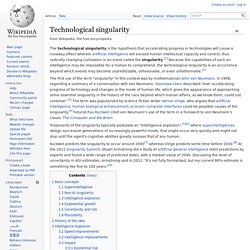

ArmMelt. Sound symbolism. In linguistics, sound symbolism, phonesthesia or phonosemantics is the idea that vocal sounds or phonemes carry meaning in and of themselves.

Origin[edit] In the 18th century, Mikhail Lomonosov propagated a theory that words containing certain sounds should bear certain meanings; for instance, the front vowel sounds E, I, YU should be used when depicting tender subjects and those with back vowel sounds O, U, Y when describing things that may cause fear ("like anger, envy, pain, and sorrow").[1] Saussure himself is said to have collected examples where sounds and referents were related. Unexplained Mysteries - Paranormal Phenomena and the World's Greatest Unexplained Mysteries.
STEPHEN FRY: WHAT I WISH I'D KNOWN WHEN I WAS 18. Technological singularity. The technological singularity is the hypothesis that accelerating progress in technologies will cause a runaway effect wherein artificial intelligence will exceed human intellectual capacity and control, thus radically changing civilization in an event called the singularity.[1] Because the capabilities of such an intelligence may be impossible for a human to comprehend, the technological singularity is an occurrence beyond which events may become unpredictable, unfavorable, or even unfathomable.[2] The first use of the term "singularity" in this context was by mathematician John von Neumann.

Proponents of the singularity typically postulate an "intelligence explosion",[5][6] where superintelligences design successive generations of increasingly powerful minds, that might occur very quickly and might not stop until the agent's cognitive abilities greatly surpass that of any human.